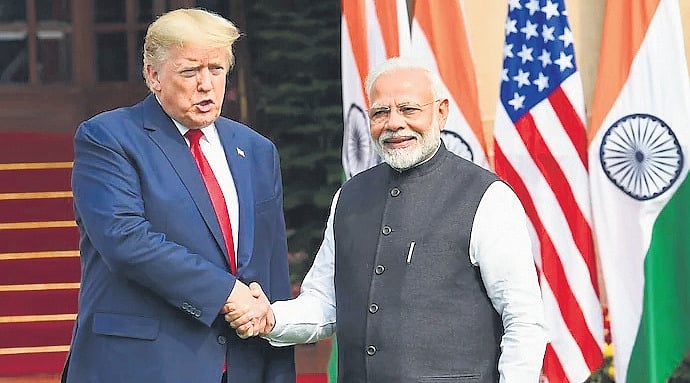**Historical and Factual Ignorance or Denial, Arab Propaganda, Left-Liberal Guilt, and Outright Antisemitism Serve to Legitimize a Demand for a Sovereign Palestinian State Where None Has Ever Existed**
*By Hymie Rubenstein | Bio and Archives – September 30, 2025*
—
Because it codifies the principles that govern statehood and sovereignty, the Montevideo Convention is a foundational document in international law. It also reflects the principles of equality among states and the importance of peaceful relations between them.
Signed on December 26, 1933, in Montevideo, Uruguay, the Convention established the following four criteria for statehood:
– A clearly defined territory over which it exercises effective control;
– A permanent population composed of individuals who reside within its territory on an ongoing basis;
– A functioning government capable of maintaining law and order, providing public services, and representing the interests of its population;
– The capacity to engage in diplomatic relations and allied interactions with other states.
—
### Canada’s Recognition of Palestine: A Questionable Move
On Sunday, September 21, Prime Minister Mark Carney arbitrarily and unilaterally announced Canada’s recognition of Palestine as a sovereign state. In doing so, Carney ignored three of the Montevideo Convention’s criteria, either out of sheer ignorance or a deliberate rejection of their application. The only criterion acknowledged was the existence of a permanent population.
This recognition contradicts Canada’s support since 1947 of a two-state solution as part of a negotiated settlement between Israelis and Palestinians. Moreover, it was based on commitments from the corrupt and incompetent Palestinian Authority to introduce much-needed reforms, including holding general elections next year, disarming Hamas, and complete demilitarization—a pipe dream at best.
Carney claimed Canada’s new policy is part of a coordinated international effort to preserve the two-state vision. He rejected criticism from political opponents and Jewish groups that such recognition legitimizes or rewards terrorism and compromises Israel and its security. Notably, Carney bypassed parliament in making this announcement and disregarded Gaza-specific conditions like establishing a democratic government and disarmament.
Currently, over 150 countries recognize Palestinian statehood, though many commentators view this recognition as symbolic and performative rather than substantive and binding.
This gratuitous move is not only a clear repudiation of Canadian diplomatic values but also best seen as a transparent political ploy to gain support from antisemitic Canadian voters. Conversely, the announcement is largely meaningless in the broader context of the Israeli-Palestinian conflict, given Canada’s limited international diplomatic influence.
—
### Historical Context: The Palestine Issue and Statehood
The Peel Commission concluded that partition between a small Israeli state and a much larger Muslim state was the only solution.
Carney’s decision ignores the fundamental fact that there has never been an autonomous Palestinian state in human history or pre-history. Indeed, Palestinian identity surged almost entirely in opposition to the re-creation of the modern state of Israel by the United Nations in 1947-48—a body now often controlled by countries antagonistic toward Israel.
As the ongoing war between Israel and its many terrorist foes—including Hamas, Hezbollah, the Popular Front for the Liberation of Palestine, Islamic Jihad, the Palestine Liberation Organization, Houthis, and the Muslim Brotherhood—continues, long-standing myths are only now being challenged. These myths include:
– Palestinians have always wanted a state of their own;
– Israel has consistently prevented Palestinians from achieving statehood;
– Israel is an apartheid regime.
These myths are bolstered by calls from dozens of nations asserting Palestinians deserve their own state. However, except for a shift in Israeli public and official opinion following the genocidal invasion of Israel by Hamas on October 7, 2023, the claim that Israel opposes Palestinian statehood lacks basis. Israel has expressed willingness to accept Palestinian statehood on several occasions: 1937, 1947-48, 1967, 2000-01, and 2007. Each time, statehood was rejected by Palestinian leadership and its supporters who opposed any two-state solution that would see an Arab state neighboring a Jewish one.
—
### The 1937 Peel Commission Report
In 1937, the British—then governing much of the former Ottoman Empire—published the Palestine Royal Commission Report, also known as the Peel Commission Report.
The report described an irrepressible conflict between two national communities and recommended partition into a small Jewish state and a much larger Arab state. It noted that due to intense antisemitism among Arabs and Muslims, national assimilation between Arabs and Jews was ruled out.
While Jewish communities accepted the Peel partition plan, the Arabs rejected it outright, insisting that all of Palestine be placed under Arab control and that nearly all Jews be deported or ethnically cleansed from the area. The Arab aim was not independent Palestinian statehood but rooted antipathy to Jewish sovereignty over part of the Biblical Promised Land, where Jews had become the majority by 1937.
—
### United Nations Partition Plan and Aftermath
After World War II, the United Nations called for partitioning the land into separate Arab and Jewish states. Jews accepted the plan, while Arabs rejected it.
In 1948, supported by the UN mandate, Jewish leadership declared statehood over the designated area. Arab states—Egypt, Jordan, Syria, Iraq, Lebanon, with support from Saudi Arabia, Yemen, and Libya—launched a genocidal war aiming to eliminate the Jewish state and exterminate its population in a Nazi-style campaign.
Simply put, Israel’s enemies did not want a Palestinian state; they wanted no Jewish state at all.
Similar rejections of partition were seen after the Six-Day War of 1967, the 2000-01 negotiations led by U.S. President Bill Clinton, and the 2007 offer from Israeli Prime Minister Ehud Olmert.
—
### Hamas Charter and Continued Denial of Jewish Sovereignty
The refusal to share the land with Jews is enshrined in the 2017 Hamas Charter, which asserts:
*“Palestine, which extends from the River Jordan in the east to the Mediterranean in the West and from Ras al-Naqurah in the north to Umm al-Rashrash in the south, is an integral territorial unit. It is the land and the home of the Palestinian people. The expulsion and banishment of the Palestinian people from their land and the establishment of the Zionist entity therein do not annul the right of the Palestinian people to their entire land and do not entrench any rights therein for the usurping Zionist entity.”*
—
### The Absence of a Historic Palestinian State
A common misunderstanding is that Palestinians are an ancient people whose sovereign state was stolen, most recently by Israel. History shows otherwise.
Before Israel, there was the British Mandate—not a Palestinian state. Before that, the Ottoman Empire ruled the territory, not a Palestinian state. Earlier still, various empires and kingdoms—such as Israel and Judah—dominated the land.
Since the destruction of the second kingdom of Judea in the second century CE, the region renamed Syria Palaestina by Roman conquerors to obscure Jewish ties, has been governed by successive foreign powers.
From 638 CE to 1917 (when Britain took control post-Ottoman Empire), no separate administrative or socio-cultural entity called Palestine existed. The Ottoman Turks regarded Palestine as part of Southern Syria.
For most of recorded history, neither residents nor foreigners recognized a distinct people called Palestinians living in a place named Palestine.
—
### Palestinian Identity: A 20th-Century Development
The absence of a unique Palestinian identity before 1948 is largely due to the lack of a distinct language, religion, nationality, or culture.
The modern Palestinian identity developed only since the early 20th century, emerging from Arab Muslim ideology and local tribal and clan affiliations. Pan-Arab and Islamic identities, rather than a unique Palestinian ethnicity, have historically united these people.
Interestingly, Palestinians today have a weaker claim to statehood than many other ethnic groups without sovereign nations—such as Kurds, Tibetans, and Chechens—most of whom have never been granted statehood and certainly have never rejected it repeatedly.
—
### The Reality Behind the Demand for Statehood
Despite widespread assertions that Palestinians deserve a state, most Palestinians advocate a one-state solution that excludes Jews entirely—a “Judenrein” state—from the Jordan River to the Mediterranean Sea. This denies the continuous Jewish presence in the land stretching back over 3,000 years, as documented in biblical and archaeological records.
—
### The Apartheid Claim: A Misguided Accusation
The apartheid allegation is the latest in a global effort to delegitimize Israel, whose modern existence was established not by lethal force—as is common among nations, including Canada—but by a democratic vote of the United Nations.
If Israel and the Palestinian territories were considered an apartheid regime, then many countries would fall under the same label based on their treatment of indigenous and ethnic minorities.
For example, the reserve system for Indigenous peoples in Canada inspired the apartheid system in South Africa, highlighting a double standard in how Israel is uniquely criticized.
—
### Conclusion
Historical and factual ignorance, denial, Arab propaganda, left-liberal guilt, and outright antisemitism have all contributed to legitimizing claims for a sovereign Palestinian state where none has historically existed.
Understanding this complex history is essential to framing an honest and productive dialogue about peace in the Middle East.
—
*View Comments*
https://canadafreepress.com/article/171580



